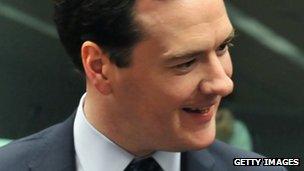Financial Services Bill is unveiled by Osborne
- Published

George Osborne says the new bill will make it clear who is in charge of regulating the financial system
The Chancellor George Osborne has revealed details about the Financial Services Bill that will overhaul regulation of the sector.
It will give the Chancellor the power to veto decisions made by the Bank of England when dealing with bank bailouts and other interventions.
One aim is to prevent a repeat of the Northern Rock collapse.
The bill will replace the so-called Tripartite structure, introduced by the previous Labour government.
The structure was made up of the FSA, the Treasury and the Bank of England, a system George Osborne said was "incoherent" and "without clear lines of accountability".
One major change will see the abolition of the Financial Services Authority.
The bill will create three new bodies, the first two within the Bank of England, to regulate financial services:
the Financial Policy Committee (FPC), which will have overall responsibility for financial regulation and monitoring the risks of the financial sector to the economy. It will oversee, and have the power to instruct, two new financial watchdog.
the Prudential Regulation Authority (PRA), which will take over responsibility for supervising the safety and soundness of individual financial firms.
the Financial Conduct Authority (FCA), which will be tasked with protecting consumers from sharp practices, and making sure that workers in the financial services sector comply with rules.
"The Financial Services Bill will overhaul the failed system of financial regulation which allowed such dangerous levels of leverage to emerge," Mr Osborne said in a speech at the World Economic Forum (WEF) in Davos.
"Everyone was so focused on ticking off a regulatory checklist that nobody felt it was their responsibility to use their judgment."
'Clear lines'
The Chancellor said that lack of clarity meant the Royal Bank of Scotland was allowed to take over the Dutch bank ABN Amro when the credit markets had already frozen up, something which ultimately led to its £45.5bn bailout.
He added: "We are putting in place clear lines of accountability, and restoring that crucial element of judgment."
The bill means that, during "normal" times, the Bank of England will be responsible for regulation and stability and accountable to Parliament.
But in a crisis, when taxpayers' money is at risk, both the responsibility and the power to act will rest with the Chancellor of the day.
This system would mean there would be no ambiguity about who was in charge, according to Mr Osborne.
Sarah Brooks, the director of financial services at Consumer Focus, said the plans were good news for personal finances.
"Particularly welcome steps include early interventions on banning products," she said.
"This should help stop many of the issues which have been endemic in this market in recent years. Transferring responsibility for credit over to the Financial Conduct Authority is also a good common-sense move."
The Financial Services Bill must go before parliament before it becomes law.
Separately, in a BBC interview at the WEF in Davos, the head of the International Monetary Fund, Christine Lagarde, said the government's austerity package, which was implemented in response to the debt crisis, was "the right thing to do".
"Under the current circumstances, the policy in place that consists of letting the automatic stabilisers move without readjusting and tightening the principles is the right thing to do," she said.
- Published27 January 2012
- Published23 January 2012
- Published25 January 2012